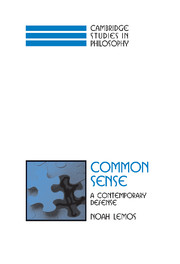Book contents
- Frontmatter
- Contents
- Acknowledgments
- Preface
- 1 The Common Sense Tradition
- 2 Common Sense and Reliability I
- 3 Common Sense and Reliability II
- 4 Reid, Reliability, and Reid's Wrong Turn
- 5 Moore, Skepticism, and the External World
- 6 Chisholm, Particularism, and Methodism
- 7 Common Sense and A Priori Epistemology
- 8 Particularism, Ethical Skepticism, and Moral Philosophy
- Conclusion
- Selected Bibliography
- Index
2 - Common Sense and Reliability I
Published online by Cambridge University Press: 22 August 2009
- Frontmatter
- Contents
- Acknowledgments
- Preface
- 1 The Common Sense Tradition
- 2 Common Sense and Reliability I
- 3 Common Sense and Reliability II
- 4 Reid, Reliability, and Reid's Wrong Turn
- 5 Moore, Skepticism, and the External World
- 6 Chisholm, Particularism, and Methodism
- 7 Common Sense and A Priori Epistemology
- 8 Particularism, Ethical Skepticism, and Moral Philosophy
- Conclusion
- Selected Bibliography
- Index
Summary
In this chapter, I consider one line of criticism of the common sense tradition. This objection holds that (1) perceptual and mnemonic knowledge require that one know that one's perception and memory are reliable, (2) the only epistemically satisfactory way to know that they are reliable is through a “non-circular” argument, and (3) the common sense philosopher has no such argument. If this objection were sound, then the common sense philosopher would not know what he thinks he knows. Many of the beliefs he takes as “data” would lack the positive epistemic status he takes them to have. In this chapter and the next, I will defend the view that we may reasonably reject both (1) and (2).
In the first section, I consider some of the assumptions that underlie this objection. In the second section, I consider the views of William Alston and Ernest Sosa concerning our knowledge of the reliability of our ways of forming beliefs. Sosa argues, roughly, that when it comes to knowing that our ways of forming beliefs are reliable, we cannot escape epistemic circularity; however, he holds that this fact does not prevent us from knowing that our ways of forming beliefs are reliable. I think Sosa's view is right, and that it provides a way in which the common sense philosopher might respond to this objection.
TWO ASSUMPTIONS
Here are two assumptions:
A1 Both perceptual and mnemonic knowledge require that one know or be justified in believing that perception and memory are reliable.[…]
- Type
- Chapter
- Information
- Common SenseA Contemporary Defense, pp. 24 - 47Publisher: Cambridge University PressPrint publication year: 2004



